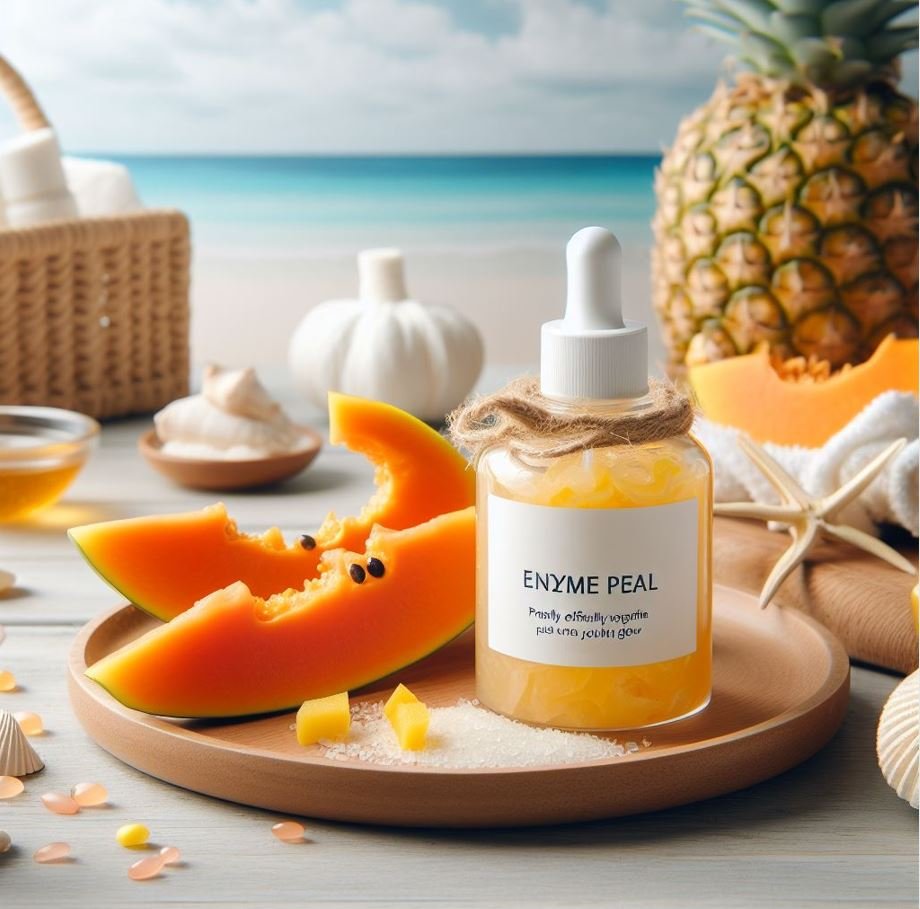
In the last few years, lots of people have been loving enzyme peels for their skin. And you know what? It totally makes sense! These treatments have become super famous, and it’s not just a temporary thing. Enzyme peels have become a big deal in skincare because they bring some really good changes to how we take care of our skin. People all over the world are excited about these treatments, and it’s easy to see why!
This article will help you dive into reasons why enzyme peel treatment have become such a sensation in today’s captivating world of skincare and also why you might consider incorporating this treatment in your routine to improve your skin health and texture.
- What is an Enzyme?
- What is an Enzyme Peel?
- What does Enzyme Peel do?
- Is Enzyme Peel a Chemical Peel?
- How Enzyme Peel Treatment is done?
- 1. Skin cleansing
- 2. Skin analysis (professional treatment )
- 3. Prepping the skin
- 4. Treatment Application
- 5. Monitoring (professional treatment )
- 6. Removal
- 7. Post treatment care
- How often can you use Enzyme Peel?
- At home enzyme peels
- Professional enzyme peels
- When NOT to use Enzyme Peel Treatment ?
- 1. Wounds on skin
- 2. Sunburn
- 3. Recent waxing
- 4. Skin infections
- 5. Pregnancy
- 6. Skin conditions
- 7. Recent chemical peels
- 6. Skin sensitivity
- 8. Acne-prone skin
- 9 . Over exfoliation
- Conclusion
- Frequently Asked Questions
What is an Enzyme?
An enzyme is a type of protein that helps in speeding up the chemical reactions in our body. They act as biological catalyst in living organisms. They are very important for processes like digestion , metabolism , respiration and other processes – as well as in supporting skin health.

What is an Enzyme Peel?
Enzyme peels , also known as enzyme exfoliants or enzymatic peels are skincare treatments or products that uses enzymes derived from natural sources( primarily fruits and vegetables) that helps exfoliating the skin gently. The enzymes used in these peels are derived from plant-based ingredients. Some common sources of enzymes found in enzyme peel are ; papaya , pineapple, pomegranate, lemon , kiwi , mango etc.
What does Enzyme Peel do?
Enzyme peel have various functions , such as :
- Enzyme peels gently exfoliate for smoother skin.
- Known for a gentle approach suitable for all skin types.
- Results vary based on formulation and skin type.
- Effectively removes dead skin, preventing dullness.
- Supports the natural process of skin rejuvenation.
- Interaction between enzymes and dead skin proteins.
- Breaks bonds holding dead skin cells together.
- Promotes skin renewal for a fresher complexion.
- Prevents issues linked to dead skin accumulation.
- A beneficial addition to a routine for glowing skin.
To know about more benefits of enzyme peels , read our article https://unveilglow.com/skincare-2/enzyme-peels-benefits-for-skin/
Is Enzyme Peel a Chemical Peel?
Enzyme peel is a type of chemical peel and they both aim to exfoliate the skin effectively ,but the enzyme peel works completely different from other chemical peels that uses strong acids. Both improves the skin texture and overall skin health but there are many key differences between these two.
How Enzyme Peel Treatment is done?
The treatment can be done at both home and spas . General steps of enzyme peel treatment are:
1. Skin cleansing
First and foremost its important to cleanse your skin thoroughly to remove any makeup , dirt and excess oils. Make sure to use a cleanser that suits your skin type.
2. Skin analysis (professional treatment )
If you are getting this treatment from any spa or skin clinic , your dermatologist or esthetician make perform a skin analysis to determine your skin need and skin type to treat accordingly.
3. Prepping the skin
If you are at a spa or clinic , the professional may apply a prep solution to your skin to prepare it for the treatment and improve its effectiveness.
4. Treatment Application
The product may come in different forms such as gels, creams or masks. The formulation will depend on the type of enzyme peel used. Finally the enzyme peel product is applied to your skin. Let the product sit on your skin for required time.
5. Monitoring (professional treatment )
Again if you are getting this from a professional , then the professional will keep monitoring your skin to avoid and reaction or any irritation.
6. Removal
After the designated time , its time to remove the enzyme peel treatment. Some enzyme peels need rinsing off while other can just be wiped off. Depending on how your enzyme peel is , gently remove the product.
7. Post treatment care
After the treatment , follow any after-care treatment recommended by your professional, or if your are doing this treatment at home ,follow the guidelines given on your product.
How often can you use Enzyme Peel?
Now that the benefits have convinced you to try this treatment , you must be wondering how often can you do it?
The frequency of enzyme peel treatment can vary depending many factors such as your skin type , formulation of enzyme peel you are using , and how much your skin can tolerate the process of skin exfoliation.
At home enzyme peels
They have formulation that is very gentle on skin. Hence they can be used one or twice a week. However, you must keep in mind the instructions and guidelines of the specific enzyme peel you are using.
Professional enzyme peels
Professional treatments offered at spas or skincare clinics may have different recommended frequencies , depending upon your skin need and on strength of the enzyme peel used. Your dermatologist or esthetician can guide you better in this case.
Its very important that if you are using enzyme peel for the first time then you should start with lower frequency and gradually increase it so your skin gets familiar with the treatment. If you are still unsure about the right frequency for enzyme peel treatments , you should consult your dermatologist or esthetician as they can guide you better after assessing your skin type , skin needs and skin tolerance.
When NOT to use Enzyme Peel Treatment ?
Although enzyme peels can serve numerous benefits for your skin , there are certain skin conditions in which it is advisable to avoid or be extra cautious using these treatments. These include the following :
1. Wounds on skin
You should avoid using enzyme peel treatment if you have unhealed wound on you skin or any type of cut or broken skin. This can cause severe irritation on that place and your skin might react to the product.
2. Sunburn
If your skin is sunburned , then you should not use this treatment unless the skin has healed completely . Exfoliating such skin can increase the chance of skin reaction and prolong the process of healing.
3. Recent waxing
You should wait a little ( few days will suffice ) before applying enzyme peel treatment after you have freshly waxed your skin . Exfoliating skin that has recently been waxed is more prone to skin irritation or reactions.
4. Skin infections
You should NOT use any enzyme peel treatment if you have any sort of bacterial, viral or fungal skin infection. The treatment may spread the infection and cause irritation.
5. Pregnancy
Although many enzyme peel treatments are safe to use during pregnancy , but its best to consult your dermatologist or esthetician before getting this treatment done to avoid any negative consequences.
6. Skin conditions
You should avoid using enzyme peel treatment if you have any skin condition like eczema , psoriasis , dermatitis etc. Enzyme peel can worsen the skin condition and cause irritation.
7. Recent chemical peels
If you have recently gotten any chemical or laser treatment , wait until its completely healed and only then go for enzyme peel treatment. Using many exfoliating treatments , not giving enough time to your skin for healing , is not a wise decision and increases risk of irritability.
6. Skin sensitivity
If you have very sensitive skin that reacts on using different skincare products. You should definitely consult a professional before using enzyme peel treatment.
8. Acne-prone skin
Enzyme Peels are generally gentle and help exfoliate without causing excessive irritation. But avoid using them on active breakouts, perform a patch test first, and follow product instructions. Consult a dermatologist if you have concerns or use other acne medications.
9 . Over exfoliation
Using enzyme peel treatments very often can cause over-exfoliation of skin that may lead to damage skin barrier . Therefore it is better to use these treatments with the right frequency.
Conclusion
In conclusion, enzyme treatments have no doubt became immensely popular in skincare .They are a gentle skincare solution that offers a wide range of benefits for individuals aiming to have healthier and brighter skin. Since derived from natural enzymes found in fruits and vegetables , these peels serve as a better and safe option for skin exfoliation. Whether you are looking for glowing skin , improved skin texture or general good overall skin health , enzyme peels can be a great addition to your skincare regime.
However , it is essential to use enzyme peels that suits your skin type and have good ingredients in their formulation. If you have any specific skin concerns, its better to discuss with a licensed esthetician that can provide personal and effective guidelines according to your skin. Remember that achieving a radiant and healthy skin is a holistic journey that requires other proper skincare practices along with using such treatments.
Frequently Asked Questions
What is a enzyme peel?
An enzyme peel is a gentle skincare treatment that exfoliates the skin’s outer layer. It removes dead skin cells, promoting a smoother complexion by breaking bonds between enzymes and dead skin proteins. Regular use supports skin rejuvenation and prevents issues related to dead skin accumulation.
Is enzyme peel better than chemical peel?
The choice between an enzyme peel and a chemical peel depends on individual preferences and skin needs. Enzyme peels are generally milder, suitable for sensitive skin, and offer gentle exfoliation. Chemical peels can be more intense, addressing specific skin concerns like deep wrinkles or acne scars, but may require more downtime and can be harsher on sensitive skin. It’s essential to consider your skin type, concerns, and desired results when choosing between the two.
What are the side effects of enzyme peels?
Enzyme peel side effects are generally mild, including temporary redness, tingling, and dryness. Some individuals may experience increased sensitivity to sunlight, so sunscreen is recommended. Rare allergic reactions can occur, and pregnant or breastfeeding individuals should consult a healthcare professional before use.